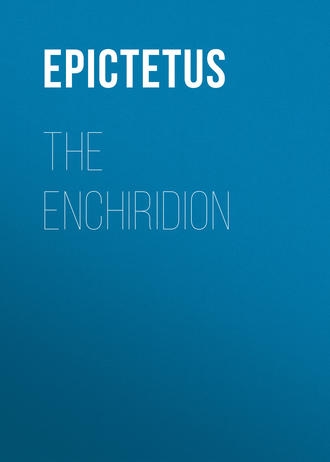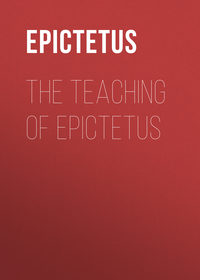 полная версия
полная версияThe Enchiridion
When you have learned to nourish your body frugally, do not pique yourself upon it; nor, if you drink water, be saying upon every occasion, “I drink water.” But first consider how much more frugal are the poor than we, and how much more patient of hardship. If at any time you would inure yourself by exercise to labor and privation, for your own sake and not for the public, do not attempt great feats; but when you are violently thirsty, just rinse your mouth with water, and tell nobody.
XLVIIIThe condition and characteristic of a vulgar person is that he never looks for either help or harm from himself, but only from externals. The condition and characteristic of a philosopher is that he looks to himself for all help or harm. The marks of a proficient are that he censures no one, praises no one, blames no one, accuses no one; says nothing concerning himself as being anybody or knowing anything. When he is in any instance hindered or restrained, he accuses himself; and if he is praised, he smiles to himself at the person who praises him; and if he is censured, he makes no defense. But he goes about with the caution of a convalescent, careful of interference with anything that is doing well but not yet quite secure. He restrains desire; he transfers his aversion to those things only which thwart the proper use of our own will; he employs his energies moderately in all directions; if he appears stupid or ignorant, he does not care; and, in a word, he keeps watch over himself as over an enemy and one in ambush.
XLIXWhen anyone shows himself vain on being able to understand and interpret the works of Chrysippus,7 say to yourself: “Unless Chrysippus had written obscurely, this person would have had nothing to be vain of. But what do I desire? To understand nature, and follow her. I ask, then, who interprets her; and hearing that Chrysippus does, I have recourse to him. I do not understand his writings. I seek, therefore, one to interpret them.” So far there is nothing to value myself upon. And when I find an interpreter, what remains is to make use of his instructions. This alone is the valuable thing. But if I admire merely the interpretation, what do I become more than a grammarian, instead of a philosopher, except, indeed, that instead of Homer I interpret Chrysippus? When anyone, therefore, desires me to read Chrysippus to him, I rather blush when I cannot exhibit actions that are harmonious and consonant with his discourse.
LWhatever rules you have adopted, abide by them as laws, and as if you would be impious to transgress them; and do not regard what anyone says of you, for this, after all, is no concern of yours. How long, then, will you delay to demand of yourself the noblest improvements, and in no instance to transgress the judgments of reason? You have received the philosophic principles with which you ought to be conversant; and you have been conversant with them. For what other master, then, do you wait as an excuse for this delay in self-reformation? You are no longer a boy but a grown man. If, therefore, you will be negligent and slothful, and always add procrastination to procrastination, purpose to purpose, and fix day after day in which you will attend to yourself, you will insensibly continue to accomplish nothing and, living and dying, remain of vulgar mind. This instant, then, think yourself worthy of living as a man grown up and a proficient. Let whatever appears to be the best be to you an inviolable law. And if any instance of pain or pleasure, glory or disgrace, be set before you, remember that now is the combat, now the Olympiad comes on, nor can it be put off; and that by one failure and defeat honor may be lost or – won. Thus Socrates became perfect, improving himself by everything, following reason alone. And though you are not yet a Socrates, you ought, however, to live as one seeking to be a Socrates.
LIThe first and most necessary topic in philosophy is the practical application of principles, as, We ought not to lie; the second is that of demonstrations as, Why it is that we ought not to lie; the third, that which gives strength and logical connection to the other two, as, Why this is a demonstration. For what is demonstration? What is a consequence? What a contradiction? What truth? What falsehood? The third point is then necessary on account of the second; and the second on account of the first. But the most necessary, and that whereon we ought to rest, is the first. But we do just the contrary. For we spend all our time on the third point and employ all our diligence about that, and entirely neglect the first. Therefore, at the same time that we lie, we are very ready to show how it is demonstrated that lying is wrong.
Upon all occasions we ought to have these maxims ready at hand:
Conduct me, Zeus, and thou, O Destiny,Wherever your decrees have fixed my lot.I follow cheerfully; and, did I not,Wicked and wretched, I must follow still.8Who’er yields properly to Fate is deemedWise among men, and knows the laws of Heaven.9And this third:
“O Crito, if it thus pleases the gods, thus let it be.”10“Anytus and Melitus may kill me indeed; but hurt me they cannot.”111
Happiness, the effect of virtue, is the mark which God has set up for us to aim at. Our missing it is no work of His; nor so properly anything real, as a mere negative and failure of our own.
2
[Chapter XV of the third book of the Discourses, which, with the exception of some very trifling differences, is the same as chapter XXIX of the Enchiridion. – Ed.]
3
Euphrates was a philosopher of Syria, whose character is described, with the highest encomiums, by Pliny the Younger, Letters I. 10.
4
[The two inimical sons of Oedipus, who killed each other in battle. – Ed.]
5
[This refers to an anecdote given in full by Simplicius, in his commentary on this passage, of a man assaulted and killed on his way to consult the oracle, while his companion, deserting him, took refuge in the temple till cast out by the Deity. – Tr.]
6
[Reference is to Zeno of Cyprus (335-263 B.C.), the founder of the Stoic school. – Ed.]
7
[Chrysippus (c. 280-207 B.C.) was a Stoic philosopher who became head of the Stoa after Cleanthes. His works, which are lost, were most influential and were generally accepted as the authoritative interpretation of orthodox Stoic philosophy. – Ed.]
8
Cleanthes, in Diogenes Laertius, quoted also by Seneca, Epistle 107.
9
Euripides, Fragments.
10
Plato, Crito, Chap. XVII.
11
Plato, Apology, Chap. XVIII.


